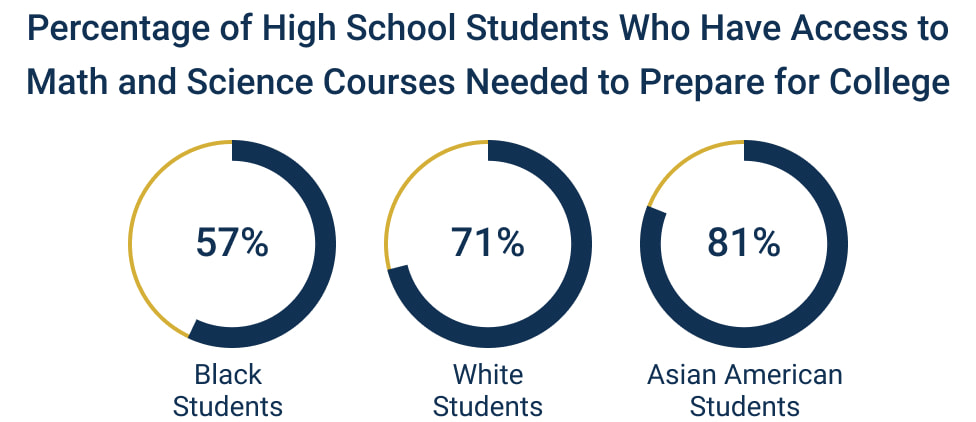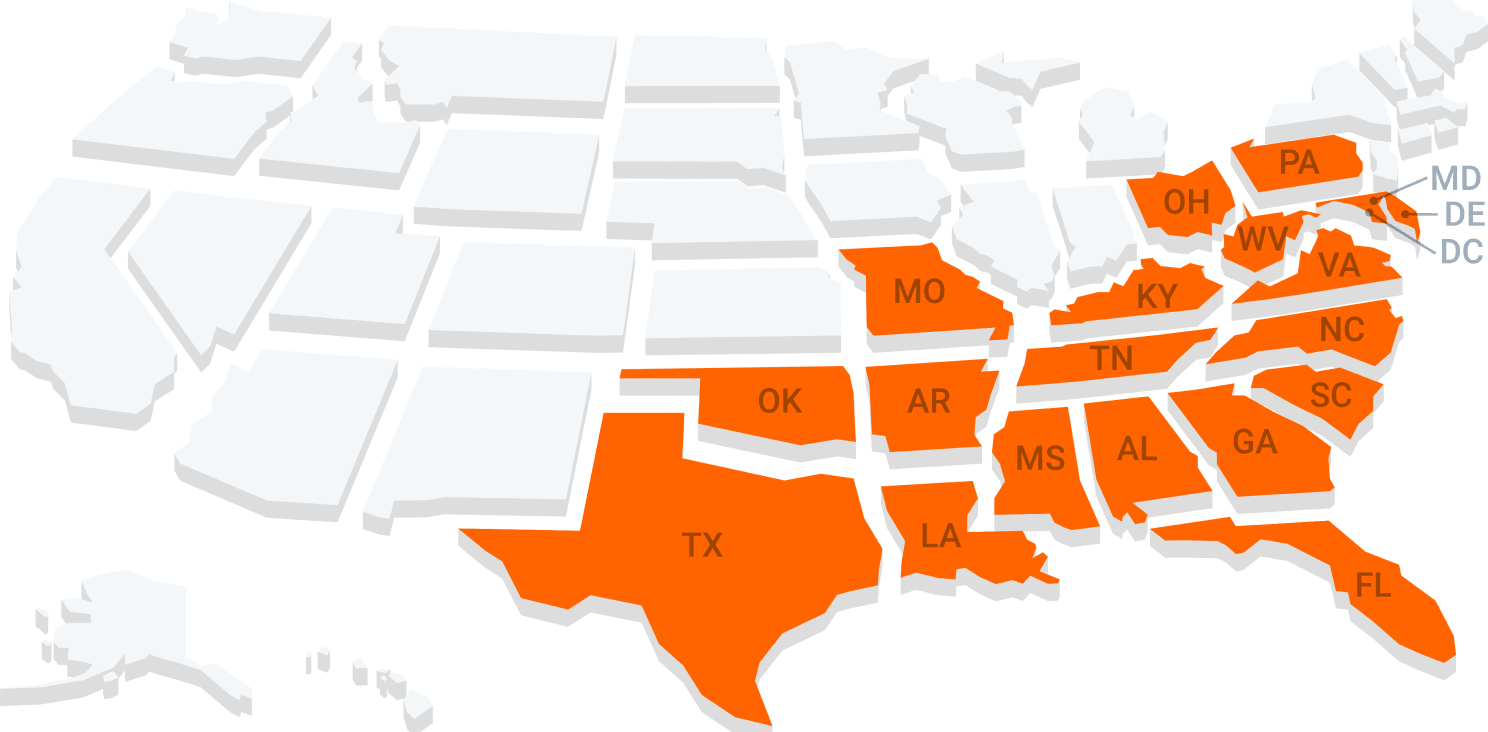College Guide for Black Students
Over the past several decades, we have seen an overall increase in the number of students of color on college campuses. Enrollment data shows that approximately 40% of today's college students identify as Black, Hispanic, Asian, Native American, and mixed race. Specifically, as of 2018, about 13% of undergraduate students identified as Black. In real numbers, there was a significant growth in just two decades—from 1.5 million African American undergraduates in 2000 to 2.1 million in 2020.
However, mixed in among these positive signs are some equally disheartening statistics. Only 15% of Black students attend a highly selective institution, and only 8% of Black students are enrolled in an elite research institution. Perhaps even more disturbing is that only 45.9% of Black students at four-year schools complete their undergraduate degrees in six years, which is the lowest graduation rate of all races. That number drops to 40% for Black men.

ON THIS PAGE
Common Barriers Choose a College HBCUs Scholarships Other ResourcesWe've prepared this resource guide to help Black students understand and address some of the common obstacles that may make it challenging for them to get a college education. The guide includes expert advice on selecting the right college and tips on applying for scholarships for African American students. Our featured experts are Brandi Stone, director of the University of New Mexico's African American Student Services, and Joshua Hamilton, director of the University of Arizona's African American Student Affairs.
Meet Our Experts

Brandi Stone
Director of African American Student Services (AASS) and Special Advisor to the President for African American Affairs at the University of New Mexico
Brandi has worked in AASS for 7 years. Her passion is in creating a community inclusive of Black student scholars and cultivating a culture of Black Excellence. Brandi also currently serves as a national board member for the Association of Black Culture Centers (ABCC), where she is responsible for communicating the unique needs of Black students in the southwest region and assisting in the development of shared standards for BCCs at the national level. As a New Mexico native, Brandi received both her Bachelor of Arts in Political Science and Master of Public Administration degree from the University of New Mexico and is a proud second-generation Lobo!

Joshua Hamilton
Director of African American Student Affairs at the University of Arizona
Joshua works to build community, support diversity initiatives, facilitate a support system that helps students achieve academic excellence, and create an enriching African American cultural experience at the University of Arizona. He is passionate about Black student retention and graduation, as well as advancing diversity in higher education. Joshua holds a Bachelor of Science in Kinesiology from the University of North Texas, a Master of Education from Arizona State University, and a Doctor of Education in Educational Leadership and Administration from Northern Arizona University.
What Are Common Barriers That Black College Students Face?
Numerous studies have been conducted in an attempt to uncover some of the common obstacles that minority students face and how to address them. Among African American students, these include the demands of balancing schoolwork with jobs and family obligations and a lack of motivation. Challenges are often compounded for first-generation college students who have no family role models to turn to for guidance. The following are some of the most prominent barriers, along with advice from our experts.
Issues With Financial Aid
Many students of all races struggle with the high cost of college, and the majority turn to various forms of financial aid for help. However, data from the United Negro College Fund (UNCF) reveals that 72% of Black college students take on student debt, as opposed to 56% of their white peers. Furthermore, because the student loan process is not as transparent as it could be, many students accept loans as part of their financial aid packages without realizing the long-term impact it will have on their income after graduation. In a study of 40 male Black and Latino college students conducted by the League for Innovation in the Community College, study participants agreed that the most common challenge they faced was understanding and using financial aid.
Feelings of Loneliness and Isolation
Many within higher education have observed that some Black students, especially those who choose to live on campus at a school that's far from home, can feel lonely and homesick. Even when students choose a college where they believe they will feel welcomed and comfortable, they can't really know what it will be like until they get there.
This is another common problem that both Hamilton and Stone have seen on their campuses, and both say the answer is for students to seek out spaces where they feel included and supported. "I always encourage students to look for a Black cultural center or a multicultural center on campus," says Stone. "If your school doesn't have one, check for a Black Student Union or Black organizations in the Greek system." Hamilton adds, "You may also find a community within your residence hall, where there may be some other Black students."
Lack of College Readiness
Statistics show that African American high school seniors face greater obstacles in getting into college, and some have not been given the necessary skills to succeed when they arrive. For example, the UNCF reports that only 57% of Black high school students have access to the math and science courses they need to prepare for college, as compared to 71% of white students and 81% of Asian American students. Of the students who took the ACT in the 2015 school year, 31% of all students failed to meet college readiness benchmarks in reading, English, math, and science, but that number was double (61%) among Black students specifically.

Additionally, a report from Inside Higher Ed notes that the average non-white public school district receives $2,226 less per student than predominantly white school districts, which can also have far-reaching effects on Black children. Experts say that some of the resulting problems due to wealth gaps among high school students include a lack of familiarity with technology, poor computer skills, lack of preparation for placement tests, low engagement in extracurricular activities because students needed to work, and a reluctance to ask for help because resources have not been available in their past experience.
Hamilton insists the solution to this problem is for students to learn to be their own advocates. Enrollees should never be reluctant to ask questions, and they should feel comfortable asking anyone they can find, from official advisors and counselors to other faculty, staff, and upperclassmen who have been navigating college already.

"The students who ask for help from their community are the students who usually graduate because they got engaged and involved."
Joshua Hamilton
Director of African American Student Affairs at the University of Arizona
Stereotyping and Racism
Black students who have participated in studies have reported incidents of overt racism, as well as microaggressions, such as subtle suggestions that students are ignorant, that students should take easier courses, or that instructors have lower expectations for students of color. Some feel a contributing factor to this racism is the small number of Black leaders among staff and faculty. As of the fall of 2018, only 6% of college faculty were Black, and many in higher education believe it's problematic when African American students do not see themselves amply represented among a school's employees.
For those who are struggling with this issue, Stone recommends seeking out Black faculty members wherever possible. "Even if they're not in your department," she notes, "they have been through those experiences and want to see you succeed. Look at the faculty of your college, and see if you could have a one-on-one meeting." These mentors may not be able to give specific answers, but they can certainly provide support and direct students to additional resources.
Benefits of Getting Involved on Campus
Students who attend college in person will find many opportunities to get involved, and both Stone and Hamilton point to the unseen benefits of joining clubs, teams, and other student organizations:
Appreciating the diversity within the Black community
Says Stone, "Your experience of Blackness could be totally different from other students. Some students might be multiracial or biracial or have lived in predominantly white areas. I love seeing West Coast Black culture and East Coast Black culture and biracial Midwest culture, all coming together and redefining on our campus."
Defining personal identity
Stone notes that getting involved with others helps students recognize who they are and what they value. "Once you're in college," she asks, "what does that mean to you? And how are you going to live your best life? You're now getting to craft who you authentically want to be for the rest of your life."
Building a support network.
Hamilton has identified one final benefit, which is the value of making friends. "You can't do this alone," he says. "Go be in community with folks, because that's going to make your college experience much more enjoyable than just going to class. Learning doesn't start or end in the classroom—it happens outside of it as well."
How to Choose a College
Many factors need to be taken into consideration when choosing a college or university. Programs, cost, location, full-time versus part-time, on-campus and online offerings—all of these come into play in the decision-making process. Perhaps the most important factor of all, say many experts, is finding the right fit. For most students, this means finding the school where they feel comfortable, included, respected, and safe.
To identify the right environment for themselves, students need to review as many schools as possible. In-person visits are ideal, but if that isn't an option, students might be able to access online virtual tours, which many schools now offer on their websites.
When visiting a school in person, or even when communicating with representatives at a school's admissions office and to other faculty and staff by phone or email, Stone encourages asking questions, even if they're awkward or uncomfortable.

"You need to ask recruiters, do you have multicultural centers? Do you have student organizations where I can see myself, and that will empower me? What opportunities specifically do you have for promoting diversity within your respective fields? Ask the hard questions."
Brandi Stone
Director of African American Student Services (AASS) and Special Advisor to the President for African American Affairs at the University of New Mexico
Black students may want to consider attending minority-serving institutions (MSIs), which include historically Black colleges and universities (HBCUs) and other primarily black institutions (PBIs), but these are just some of the possibilities. Hamilton recommends looking past the type of school—especially the well-known "name" institutions—and focusing instead on what's reasonable, which may be a smaller school closer to home. He advises students to "attend the institution that is most accessible and affordable and can support you in whatever you want to study."
One final piece of advice in the college selection process is for students to thoroughly research the faculty teaching the subjects they plan to study. Not only will it ensure they get the education they're envisioning, it will help students connect with professors and build a network of support for the future. "If you're interested in engineering, for example," explains Hamilton, "then you should go on the school's website and look at the professors who teach in the college of engineering. What is their focus? What are they doing? This'll get you connected to undergraduate research, and this'll get you job opportunities."
Should I Attend an HBCU?
Among the many options available are historically Black colleges and universities (HBCUs), which include Spelman College, Hampton University, and Florida A&M University. These colleges were founded prior to the civil rights movement of the 1960s to provide higher education for Black students. Many of them, such as Howard University, Albany State University, and Tuskegee University, now offer online degree programs, giving students even more possibilities for earning their college degrees.
There are just over 100 HBCUs in the U.S., about half of which are public and the other half private. Although this represents only 3% of the nation's institutions of higher education, these schools enroll 10% of all African American students and produce nearly 20% of all African American graduates. One quarter of HBCU graduates earn degrees in STEM subjects.
Historically Black Colleges and Universities (HBCUs) Nationwide

- Alabama: 14
- Arkansas: 4
- Delaware: 1
- Florida: 4
- Georgia: 10
- Kentucky: 2
- Louisiana: 6
- Maryland: 4
- Mississippi: 7
- Missoury: 2
- North Carolina: 10
- Ohio: 2
- Oklahoma: 1
- Pennsylvania: 2
- South Carolina: 8
- Tennessee: 6
- Texas: 9
- Virginia: 5
- Washington DC: 2
- West Virginia: 2
- Not Pictured
- U.S. Virgin Islands: 1
Source: HBCU First
One advantage of attending an HBCU, according to the UNCF, may be cost. As of 2015, tuition at HBCUs was 28% less than at comparable non-HBCU schools. The UNCF adds that 40% of HBCU students report positive feelings about their financial situation while in college, as opposed to 29% of Black students attending other schools.
Still, an HBCU may be too much of a financial stretch for some, but Stone says there might be a solution: "A lot of universities offer a national student exchange program where you can attend an HBCU for up to a year or two, utilizing your financial aid package that you have at your home institution. You don't have to throw away the idea of attending an HBCU if finances are a challenge for you."
Another benefit is the sense of inclusivity that many students feel at an HBCU. As Hamilton describes it, HBCUs were created and built to serve and support students who feel marginalized. "The thing about historically Black colleges," he adds, "is that race is at the center. So if you want to be among Black students and be in community with other Black folk, you should go to an HBCU." But he's also quick to add that "Black people are not a monolith." Before selecting any school, students should carefully explore how they see themselves fitting in on a campus.
Advice on Applying for Scholarships and Financial Aid
All students who are enrolled in accredited colleges and universities are entitled to apply for federal financial aid, whether they are pursuing their degrees on campus or online. Hundreds of billions of dollars in aid are disbursed each year to all types of college students, but especially to those who come from low-income families. According to the College Board, approximately $242 billion in financial aid was awarded in the 2019-2020 school year.
To find out if they qualify for financial aid, and if so, for how much, students should begin by filling out and submitting a Free Application for Federal Financial Aid (FAFSA). Reviewers then determine whether each student can receive federal aid (such as a Pell grant), other state- and school-sponsored scholarships, student loans, or other types of assistance.
According to the College Board, approximately $242 billion in financial aid was awarded in the 2019-2020 school year.
The FAFSA can be cumbersome to fill out, and it must be renewed annually. Students and families who need help completing the form can turn to their high school or college financial aid counselors for free assistance. They can also find answers to many questions on the FAFSA website.
Private African American scholarships typically require separate applications in addition to the FAFSA, and these applications often require letters of recommendation and a written or sometimes a video essay. Personal statements like these are opportunities for students to make their case for receiving financial assistance.
When composing essay answers, Hamilton recommends being direct and straightforward. He adds that students don't have to engage in what he calls "trauma bonding," or telling the story of personally traumatic experiences, which can be traumatizing in itself, as a means of landing a scholarship. Stone offers several alternative ideas for applicants, such as focusing on the lessons they've learned from their experiences, the transferable skills they're developing in school, and their perceptions of what it means to be a person of color in whatever place and situation they're in.
Scholarships for Black Students
Applying for scholarships is often one of the highest priorities for prospective and enrolled college students. The more scholarship money students can secure, the less money they will need to borrow through loans and repay with interest. College scholarships may also enable some students to attend schools they thought were too expensive, and when added to a resume they reflect positive qualities, like dedication and determination.
Somewhat surprisingly, many students do not apply for aid or minority scholarships because they believe they aren't eligible or simply won't be rewarded with financial support. However, Stone said she has noticed a decline in applications for some scholarships recently, which may mean less competition among the students who apply. As a result, she adds, this may be an opportune time to ask for financial aid.
Black students may be particularly interested in the three lists of scholarships below: general scholarships for all Black students, scholarships for those who want to attend HBCUs, and scholarships for Black students who have already selected or are majoring in a specific field of study. Most of these scholarship opportunities are geared toward U.S. citizens earning bachelor's degrees, but a few are also for graduate students. Some are based on financial need, while others are based on academic achievement and/or community service.
These scholarships are not covered by a FAFSA application—each one requires a separate application. However, the time and effort that goes into a scholarship search is well worth the financial reward.
General Scholarships for Black Students
As the nation's largest scholarship provider for minority students, UNCF has awarded more than $5 billion dollars to 500,000 students over the last 70+ years. UNCF sponsors at least 15 annual scholarship programs.
Award Information
- $100 million in total awards given out annually
- 10,000 scholarships awarded annually
Eligibility
Applicants Must
- Eligibility requirements vary; see website for a complete list of scholarships and criteria
Application Information
- June deadlines
This scholarship celebrates the legacy of Ronald H. Brown, the late Secretary of Commerce. Recipients receive mentoring support along with their scholarship funding.
Award Information
- $40,000 awards ($10,000 per year for four years)
- Number of annual awards varies
Eligibility
Applicants Must
- Be a high school senior at the time of application
- Be an African American U.S. citizen
- Demonstrate financial need
- Exhibit academic excellence, public service, business entrepreneurship, and global citizenship
Application Information
- Early January deadline
The Jackie Robinson Foundation Scholarship
Scholarship funding is just one component of the JRF Scholarship program honoring the legendary baseball player. Recipients also engage in leadership development, community service, career assistance, and mentorship opportunities.
Award Information
- Up to $30,000 over four years
- Number of annual awards varies
Eligibility
Applicants Must
- Be a minority student
- Be planning to pursue a bachelor's degree at an accredited college or university
- Agree to perform community service to remain eligible for the scholarship
Application Information
- February 1 deadline
This is a last-dollar scholarship that covers the full cost of attendance not already covered by other forms of financial aid. Money can be used for tuition, books, supplies, and all other relevant expenses.
Award Information
- 300 annual recipients
- Award amounts vary
Eligibility
Applicants Must
- Be a U.S. citizen
- Be a high school senior
- Be a minority
- Be eligible for a Pell grant
- Have a minimum GPA of 3.3
- Plan to enroll in an accredited four-year bachelor's degree program
Application Information
- Mid-September deadline
The Herbert Lehman Education Fund Scholarship
Named for the former governor and U.S. senator from New York, Herbert Lehman, this scholarship fund is sponsored by the NAACP Legal Defense Fund.
Award Information
- 300 annual recipients
- Award amounts vary
Eligibility
Applicants Must
- Be an African American U.S. citizen
- Enrolled in or planning to attend a four-year bachelor's program
Application Information
- April 1 deadline
Scholarships for Students Attending Historically Black Colleges and Universities
HBCU Foundation General Scholarship
The HBCU Foundation is dedicated to supporting students attending HBCUs with scholarships, as well as fostering leadership potential and connecting graduates with top-tier employers.
Award Information
- $10,000 annually
- Number of annual awards varies
Eligibility
Applicants Must
- Be enrolled at one of the HBCU Foundation member colleges (see website for complete list)
- Have a minimum 2.75 GPA
- Demonstrate leadership abilities and volunteer
Application Information
- Two annual deadlines—February and October
- Required documents include a completed FAFSA, a head shot, and a video essay
Thurgood Marshall Scholarship Fund
The Thurgood Marshall College Fund (TMCF) is the largest organization representing historically Black colleges and universities (HBCUs) and predominantly Black institutions (PBIs). The fund sponsors three different scholarships, and has disbursed more than $5 million in scholarship money.
Award Information
- Three different scholarship programs
- Average award amount is $3,100
- Number of recipients varies annually
Eligibility
Applicants Must
- Be a U.S. citizen or have a valid permanent resident card
- Be enrolled at one of the TMCF-approved colleges (see website for complete list)
- Have a minimum GPA of 3.0
- Demonstrate leadership ability
- Demonstrate financial need
Application Information
- Two annual deadlines—February and October
- Required documents include transcripts, a resume, a letter of recommendation, and an essay
ETS Presidential Scholarship for HBCU Students
ETS is an association of educators, assessment developers, and researchers. This organization has partnered with the Thurgood Marshall College Fund to provide funding for students attending HBCUs.
Award Information
- Award amounts vary, but cover full tuition
- Eight recipients chosen annually—four from private HBCUs and four from public HBCUs
Eligibility
Applicants Must
- Be a U.S. citizen or have a valid permanent resident card
- Be enrolled as a junior or senior at an HBCU
- Have a minimum GPA of 3.5
- Demonstrate leadership ability
- Demonstrate financial need
Application Information
- Required documents include a current transcript, a FAFSA Student Aid Report (SAR), two letters of recommendation, one written essay, and one video essay
The Ford Motor Company and the Thurgood Marshall College Fund (TMCF) have partnered to provide funding for students attending Historically Black Colleges and Predominantly Black Institutions.
Award Information
- Awards up to $6,200
- Seven recipients chosen annually
Eligibility
Applicants Must
- Be an African American male
- Must be a high school senior or undergraduate student
- Be a U.S. citizen or have a valid permanent resident card
- Have been accepted into or be enrolled in one of the TMCF-approved colleges (see website for complete list)
- Have a minimum GPA of 3.0
- Demonstrate leadership ability
- Demonstrate financial need
Application Information
- Required documents include a current transcript, a FAFSA Student Aid Report (SAR), and a written essay
- Applicants must be able to provide a character reference from an appropriate adult
TMCF and Coca-Cola Foundation First-Generation HBCU Scholarships
The Coca-Cola Foundation has partnered with TMCF to offer this highly selective scholarship to four first-generation college students.
Award Information
- $5,000 each year ($2,500 per semester)
- Four recipients annually
Eligibility
Applicants Must
- Be a high school senior
- Be a first-generation college student who has been accepted into one of seven specific HBCUs (see website for complete list)
- Be a U.S. citizen or have a valid permanent resident card
- Have a minimum GPA of 3.0
- Demonstrate leadership ability
- Demonstrate financial need
Application Information
- Required documents include an official high school transcript, a FAFSA Student Aid Report (SAR), and a written essay
- Applicants must be able to provide a character reference from an appropriate recommender
Scholarships for Black College Students Studying Specific Subjects
Charles Shelton Veterinarian Medicine/Technology Scholarship
In 2015, only 2% of veterinary professionals identified as Black. The Charles Shelton Scholarship seeks to create more diversity in the field by offering financial support to veterinary students.
Award Information
- $2,000 awards
- Two awards given annually
Eligibility
Applicants Must
- Be a legal U.S. resident
- Be an African American high school, undergraduate, or graduate student intending to pursue or enrolled in a degree in veterinary science
Application Information
- February 1 deadline
- Required documents include transcripts, a copy of the acceptance letter from the applicant's college or university, two professional references, a resume, and a written essay
The ABA Foundation supports the motorcoach travel and tourism industry with research and scholarships. Since 1995, the ABA has awarded more than $1 million to students interested in travel and tourism for the purpose of promoting diversity within industry management.
Award Information
- $5,000
- Number of recipients varies annually
Eligibility
Applicants Must
- Have been accepted into an accredited college
- Major in any subject relevant to the travel and tourism industry (hospitality management, accounting, business management, marketing, etc.)
Application Information
- Required documents include an essay
The American Meteorological Society recognizes that it benefits from the equitable participation of a diverse community. It created this scholarship fund to encourage students from historically underrepresented groups to study atmospheric, oceanic, and hydrologic sciences.
Award Information
- $6,000 (split over two years, $3,000 per year)
Eligibility
Applicants Must
- Be a U.S. citizen or a legal permanent resident of the U.S.
- Be a minority student
- Be a high school senior who has been accepted into an atmospheric, oceanic, or hydrologic science program
- Have a minimum 3.0 GPA
Application Information
- Mid-February deadline
- Required documents include high school transcripts and a letter of recommendation
Inspired by her grandmothers, Tuania Wright created this charitable foundation to provide scholarship funding for African American students who plan to pursue careers in the medical and healthcare fields.
Award Information
- Award amounts and number of annual awards varies
Eligibility
Applicants Must
- Be an African American student
- Be a high school student graduating from a U.S. high school
- Be planning to attend a two-year, four-year, or technical school
Application Information
- April deadline
- Required documents include transcripts, a photo, cover letter, resume, two letters of recommendation, a written essay
- Optional: an acceptance letter from a college
AICPA Scholarship Award for Minority Accounting Students
The AICPA seeks to encourage minority students to study accounting so they can enter the profession. Over the past 40 years, the AICPA has awarded more than $14.6 million to 8,000 students.
Award Information
- Up to $5,000 in awards
- Number of annual recipients vary
Eligibility
Applicants Must
- Be a minority student
- Demonstrate academic achievement, leadership, and volunteerism
Application Information
- March 1 deadline
EPP Undergraduate Scholarship Program
Sponsored by the National Oceanic and Atmospheric Administration (NOAA), this scholarship is awarded to minority students who are majoring in any STEM subject that supports NOAA's mission to understand the natural world.
Award Information
- Up to $45,000 in total support over two years
Eligibility
Applicants Must
- Be a minority student
- Be a 2nd-year student enrolled in a STEM subject at a Minority Serving Institution (MSI)
- Agree to serve two summer internships at a NOAA research facility
- Be a U.S. citizen or U.S. national
- Have and maintain a minimum 3.2 GPA
Application Information
- Winter deadline
The ACS Scholars Program disburses more than $1 million each year to minority students majoring in chemistry-related disciplines. To date, more than 3,500 students have received funding from this program.
Award Information
- 300+ awards given annually
- Up to $5,000 per academic year
Eligibility
Applicants Must
- Be a U.S. citizen or a legal permanent resident of the U.S.
- Be a member of a historically underrepresented group
- Be a high school senior or enrolled at an accredited college
- Major in chemistry, biochemistry, chemical engineering, chemical technology, or another chemistry-related science and be planning to pursue chemistry as a career
- Have a minimum 3.0 GPA
- Demonstrate leadership abilities and community service
Application Information
- March 1 deadline
- Required documents include transcripts, two letters of recommendation, and a copy of the SAR from the FAFSA
- Applicants will be asked to indicate which race(s) they most identify with on the application form
American Library Association Spectrum Scholarship
Part of the mission of the American Library Association (ALA) is to promote racial and ethnic diversity among librarians. With that goal in mind, the ALA created the Spectrum Scholarship Program for minority students pursuing master's degrees in library science.
Award Information
- $5,000 (split into two installments)
- An average of 60 awards annually
Eligibility
Applicants Must
- Be a U.S. citizen or a legal permanent resident of the U.S.
- Be planning to attend an ALA-accredited graduate program
- Show a commitment to community building, as well as equity, diversity, and inclusion
Application Information
- March 1 deadline
- Required documents include a personal written statement, three letters of recommendation, transcripts from your bachelor's degree and any completed master's courses
ASA Minority Fellowship Program
The American Sociological Association (ASA) is a professional organization supporting sociologists and those who are interested in sociology. Since 1974, this fellowship program has helped more than 460 people of color earn doctoral degrees in sociology.
Award Information
- $18,000 annually
Eligibility
Applicants Must
- Be a U.S. citizen or a legal permanent resident of the U.S.
- Be a minority student
- Be a doctoral candidate in sociology
Application Information
- January deadline
- Required documents include two essays, a curriculum vitae, transcripts for doctoral work already completed, and three letters of recommendation
Additional Resources
Among the many organizations created to support African American college students and others involved in higher education, these are a few that may be of particular interest:
- HBCU Foundation, Inc.: In addition to providing scholarships for Black students attending select schools, the HBCU Foundation's mission is to foster leadership and entrepreneurial skills and to assist top-tier companies connect with talented, high-achieving students.
- Jackie Robinson Foundation: Inspired by the character and accomplishments of the organization's namesake, the Jackie Robinson Foundation offers scholarship aid, mentoring, the "42 Strategies for Success" curriculum, aid money for study-abroad programs, and other programs for recipients.
- Thurgood Marshall College Fund (TMCF): Named for Supreme Court Justice and civil rights activist Thurgood Marshall, this scholarship fund sponsors and cosponsors a number of significant minority scholarships for students who plan to attend HBCUs or other PBIs, and it provides professional development programs and job-placement assistance.
- United Negro College Fund (UNCF): For more than 70 years, the UNCF has provided funding for African American students through a broad range of general and specific scholarship programs, as well as financial support for HBCUs.
Related Articles
2023 Best HBCUs With Online Programs
Discover what an HBCU is all about — from how many HBCUs there are to who can apply. Learn the history of HBCUs and why they continue to be important.
By OnlineU Staff Writers | 10/24/2022

Both Stone and Hamilton have seen this issue first-hand among the students they work with, and both say it's imperative for students to meet with their schools' financial aid officers to ask questions and clarify the terms of their financial aid packages before agreeing to anything. Specifically, students need to ask about loan repayment terms, any requirements that must be met to retain a scholarship award (such as minimum grade point average), higher rates of tuition for in-state versus out-of-state residents, whether students can obtain in-state residency over time to lower tuition, and additional fees charged by the university.
Financial aid is a complex subject, and Hamilton adds that students should not delay in seeking help regarding finances, even if they feel stuck or think they should already know the answers. He notes that smaller issues only get bigger with time, so it's best to address any problems regarding financial assistance before they've grown out of control.